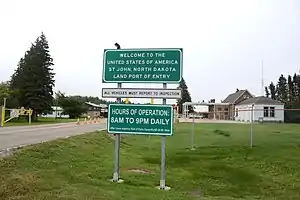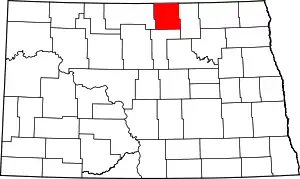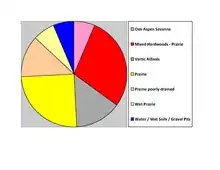Rolette County, North Dakota
Rolette County is a county in the U.S. state of North Dakota. As of the 2020 census, the population was 12,187.[1] Its county seat is Rolla.[2]
Rolette County | |
|---|---|
 | |
 Location within the U.S. state of North Dakota | |
 North Dakota's location within the U.S. | |
| Coordinates: 48°46′N 99°50′W | |
| Country | |
| State | |
| Founded | January 4, 1873 (created) October 14, 1884 (organized) |
| Named for | Joseph Rolette |
| Seat | Rolla |
| Largest community | Belcourt |
| Area | |
| • Total | 939 sq mi (2,430 km2) |
| • Land | 903 sq mi (2,340 km2) |
| • Water | 36 sq mi (90 km2) 3.9% |
| Population (2020) | |
| • Total | 12,187 |
| • Estimate (2022) | 11,933 |
| • Density | 13/sq mi (5.0/km2) |
| Time zone | UTC−6 (Central) |
| • Summer (DST) | UTC−5 (CDT) |
| Congressional district | At-large |
| Website | www |
History
The Dakota Territory legislature created the county on January 4, 1873, with territory partitioned from Buffalo County. It was not organized at that date, and was not attached to another county for judicial or administrative purposes. It was named for Joseph Rolette Jr., a fur trader and political figure from Pembina. The county government was effected on October 14, 1884, with Dunseith as the county seat. In 1885 the county seat was assigned to Saint John, and in 1889 it was assigned to Rolla.
The county boundaries were adjusted in 1883 and in 1887. It has retained its present boundary configuration since 1887.[3][4]
The International Peace Garden is located in the northwest corner of the county along the Canada–United States border with Manitoba.
Geography

Rolette County lies on the northern border of North Dakota with Canada. Gimby Creek and Wakopa Creek flow into the county from Canada. The terrain consists of dry rolling hills in the south, and more verdant low hills in the north and northwest, dotted with lakes and ponds.[5]
Part of the Turtle Mountain plateau lies in the northwestern part of the county. The terrain slopes to the south and east; its highest point is its northwest corner, at 2,195 ft (669 m) ASL.[6]
The Turtle Mountain Indian Reservation is in the northeast section of Rolette County.
Rolette County has an area of 939 square miles (2,430 km2), of which 903 square miles (2,340 km2) is land and 36 square miles (93 km2) (3.9%) is water.[7]
Major highways
Adjacent counties and rural municipalities
- Municipality of Boissevain-Morton, Manitoba - northwest
- Municipality of Killarney-Turtle Mountain, Manitoba - northeast
- Towner County - east
- Pierce County - south
- Bottineau County - west
Protected areas
Lakes
- Belcourt Lake
- Bigham Lake
- Bymes Lake
- Carpenters Lake
- Coon Lake
- Gatten Lake
- Girl Lake
- Gordon Lake
- Hartley Lake (part)
- Horseshoe Lake
- Island Lake
- Lagerquist Lake
- Lake Upsilon
- Little Gurr Lake
- Long Lake
- Lords Lake (part)
- Mill Lake
- Mill Lake
- Rabb Lake
- School Section Lake
- Schutte Lake
- South Messier Lake (part)
- Ducker Lake
- Twin Lake
- Twin Lakes (part)
- Willow Lake[5]
Demographics
| Census | Pop. | Note | %± |
|---|---|---|---|
| 1890 | 2,427 | — | |
| 1900 | 7,995 | 229.4% | |
| 1910 | 9,558 | 19.5% | |
| 1920 | 10,061 | 5.3% | |
| 1930 | 10,760 | 6.9% | |
| 1940 | 12,583 | 16.9% | |
| 1950 | 11,102 | −11.8% | |
| 1960 | 10,641 | −4.2% | |
| 1970 | 11,549 | 8.5% | |
| 1980 | 12,177 | 5.4% | |
| 1990 | 12,772 | 4.9% | |
| 2000 | 13,674 | 7.1% | |
| 2010 | 13,937 | 1.9% | |
| 2020 | 12,187 | −12.6% | |
| 2022 (est.) | 11,933 | [8] | −2.1% |
| U.S. Decennial Census[9] 1790-1960[10] 1900-1990[11] 1990-2000[12] 2010-2020[1] | |||
2020 census
As of the census of 2020, there were 12,187 people.
2010 census
As of the census of 2010, there were 13,937 people, 4,783 households, and 3,413 families in the county. The population density was 15.4 people per square mile (5.9 people/km2). There were 5,372 housing units at an average density of 5.95 units per square mile (2.30/km2). The racial makeup of the county was 77.2% American Indian, 20.3% white, 0.2% black or African American, 0.1% Asian, 0.1% from other races, and 2.1% from two or more races. Those of Hispanic or Latino origin made up 1.0% of the population. In terms of ancestry, 48.5% were French Canadian, 7.0% were German, 6.8% were Norwegian, and 0.3% were American.
Of the 4,783 households, 44.9% had children under the age of 18 living with them, 39.1% were married couples living together, 23.2% had a female householder with no husband present, 28.6% were non-families, and 25.0% of all households were made up of individuals. The average household size was 2.89 and the average family size was 3.39. The median age was 30.5 years.
The median income for a household in the county was $28,265 and the median income for a family was $35,523. Males had a median income of $35,595 versus $27,459 for females. The per capita income for the county was $13,632. About 25.9% of families and 31.8% of the population were below the poverty line, including 41.5% of those under age 18 and 24.8% of those age 65 or over.
Population by decade

Communities
Census-designated places
Townships
- Kohlmeier
- Maryville
- Shell Valley
- South Valley
- Holmes
Politics
Due to its Native American majority population, Rolette County voters are historically Democratic, more consistently so than other such counties in North Dakota. Since 1928 the only Republican to carry the county was Dwight D. Eisenhower in 1952.[13] It was the only county in the state to support George McGovern in 1972 and is additionally the only North Dakota county to have supported Jimmy Carter in 1980.[14] In each of the five presidential elections from 1996 to 2012, the Democratic candidate received over 60% of the vote, with Barack Obama winning 75.1% in 2008 and 74.0% in 2012.[15][16] In 2016, Democratic candidate Hillary Clinton received 57.3% of the county's votes,[17] one of the two North Dakota counties that she carried.
| Year | Republican | Democratic | Third party | |||
|---|---|---|---|---|---|---|
| No. | % | No. | % | No. | % | |
| 2020 | 1,257 | 33.04% | 2,482 | 65.25% | 65 | 1.71% |
| 2016 | 1,217 | 32.41% | 2,099 | 55.90% | 439 | 11.69% |
| 2012 | 1,092 | 23.99% | 3,353 | 73.66% | 107 | 2.35% |
| 2008 | 1,045 | 23.05% | 3,403 | 75.06% | 86 | 1.90% |
| 2004 | 1,392 | 34.42% | 2,564 | 63.40% | 88 | 2.18% |
| 2000 | 1,416 | 32.20% | 2,681 | 60.96% | 301 | 6.84% |
| 1996 | 823 | 22.85% | 2,299 | 63.84% | 479 | 13.30% |
| 1992 | 895 | 24.82% | 2,002 | 55.52% | 709 | 19.66% |
| 1988 | 1,126 | 31.23% | 2,426 | 67.28% | 54 | 1.50% |
| 1984 | 1,479 | 39.43% | 2,179 | 58.09% | 93 | 2.48% |
| 1980 | 1,599 | 44.84% | 1,660 | 46.55% | 307 | 8.61% |
| 1976 | 1,094 | 29.62% | 2,531 | 68.54% | 68 | 1.84% |
| 1972 | 1,713 | 48.13% | 1,803 | 50.66% | 43 | 1.21% |
| 1968 | 1,211 | 37.23% | 1,870 | 57.49% | 172 | 5.29% |
| 1964 | 892 | 25.80% | 2,566 | 74.20% | 0 | 0.00% |
| 1960 | 1,277 | 35.33% | 2,335 | 64.59% | 3 | 0.08% |
| 1956 | 1,444 | 45.44% | 1,728 | 54.37% | 6 | 0.19% |
| 1952 | 2,188 | 65.02% | 1,160 | 34.47% | 17 | 0.51% |
| 1948 | 1,179 | 41.09% | 1,565 | 54.55% | 125 | 4.36% |
| 1944 | 1,070 | 37.78% | 1,745 | 61.62% | 17 | 0.60% |
| 1940 | 1,555 | 35.41% | 2,820 | 64.21% | 17 | 0.39% |
| 1936 | 857 | 19.34% | 3,186 | 71.89% | 389 | 8.78% |
| 1932 | 706 | 19.59% | 2,855 | 79.22% | 43 | 1.19% |
| 1928 | 1,327 | 37.50% | 2,181 | 61.63% | 31 | 0.88% |
| 1924 | 869 | 35.92% | 137 | 5.66% | 1,413 | 58.41% |
| 1920 | 2,139 | 75.05% | 535 | 18.77% | 176 | 6.18% |
| 1916 | 600 | 40.00% | 762 | 50.80% | 138 | 9.20% |
| 1912 | 339 | 26.74% | 396 | 31.23% | 533 | 42.03% |
| 1908 | 811 | 55.32% | 529 | 36.08% | 126 | 8.59% |
| 1904 | 912 | 66.38% | 366 | 26.64% | 96 | 6.99% |
| 1900 | 566 | 60.41% | 355 | 37.89% | 16 | 1.71% |
Education
School districts include:[20]
- Belcourt Public School District 7 (as the Turtle Mountain Community School, in cooperation with the Bureau of Indian Education (BIE))
- Bottineau Public School District 1
- Dunseith Public School District 1
- Mount Pleasant Public School District 4
- North Star School District
- Rolette Public School District 29
- Rugby Public School District 5
- St. John Public School District 3
Former districts:
- Wolford Public School District 1[20] - Closed in 2019[21]
References
- "State & County QuickFacts". United States Census Bureau. Retrieved March 31, 2023.
- "Find a County". National Association of Counties. Retrieved June 7, 2011.
- "Dakota Territory, South Dakota, and North Dakota: Individual County Chronologies". Dakota Territory Atlas of Historical County Boundaries. The Newberry Library. 2006. Archived from the original on April 2, 2018. Retrieved February 4, 2015.
- "County History". Official Portal for North Dakota State Government. Archived from the original on February 2, 2015. Retrieved May 4, 2011.
- Rolette County ND Google Maps (accessed February 24, 2019)
- ""Find an Altitude/Rolette County ND" Google Maps (accessed February 24, 2019)". Archived from the original on May 21, 2019. Retrieved February 24, 2019.
- "2010 Census Gazetteer Files". United States Census Bureau. August 22, 2012. Archived from the original on January 29, 2015. Retrieved February 1, 2015.
- "Annual Estimates of the Resident Population for Counties: April 1, 2020 to July 1, 2022". Retrieved March 31, 2023.
- "U.S. Decennial Census". United States Census Bureau. Retrieved February 1, 2015.
- "Historical Census Browser". University of Virginia Library. Retrieved February 1, 2015.
- Forstall, Richard L., ed. (April 20, 1995). "Population of Counties by Decennial Census: 1900 to 1990". United States Census Bureau. Retrieved February 1, 2015.
- "Census 2000 PHC-T-4. Ranking Tables for Counties: 1990 and 2000" (PDF). United States Census Bureau. April 2, 2001. Archived (PDF) from the original on March 27, 2010. Retrieved February 1, 2015.
- Geographie Electorale
- David Leip's Presidential Atlas (Maps for North Dakota by election)
- The New York Times electoral map (Zoom in on North Dakota)
- 2012 presidential election results from North Dakota, New York Times. Retrieved December 27, 2016.
- 2016 presidential election results from North Dakota, New York Times (December 20, 2016). Retrieved December 27, 2016.
- Leip, David. "Atlas of US Presidential Elections". uselectionatlas.org. Retrieved April 13, 2018.
- The leading "other" candidate, Progressive Theodore Roosevelt, received 322 votes, while Socialist Eugene Debs received 184 votes, Prohibition candidate Eugene Chafin received 27 votes.
- "2020 CENSUS - SCHOOL DISTRICT REFERENCE MAP: Rolette County, ND" (PDF). United States Census Bureau. Archived (PDF) from the original on August 4, 2021. Retrieved July 23, 2022. - Text list - The map shows Wolford district's boundaries even though it was disestablished in 2019. 2010 map, 2010 text list
- "Enrollment History Public School Districts 2009-2021". North Dakota Department of Public Instruction. Retrieved August 19, 2021. - Check the 2019-2020 spreadsheet, which does not list Wolford, while previous years do.